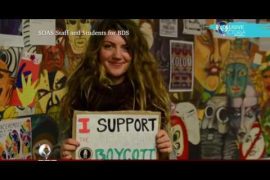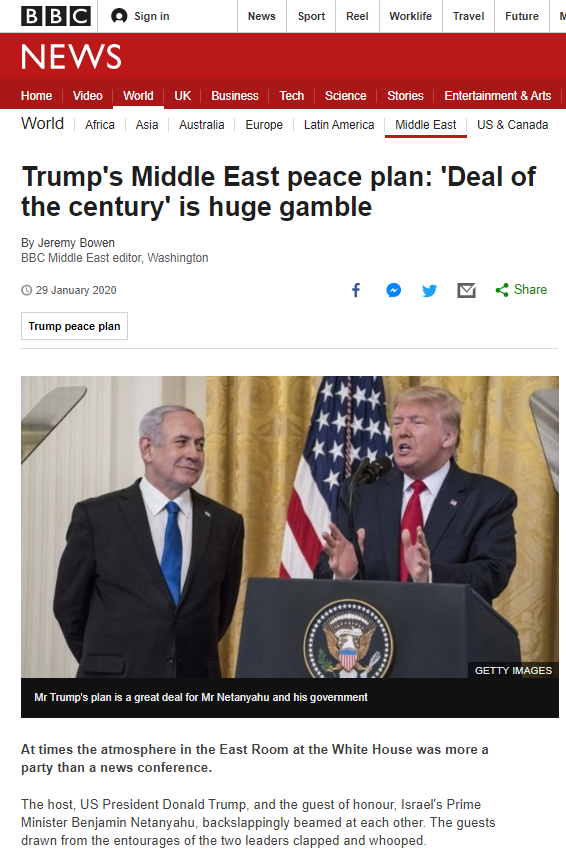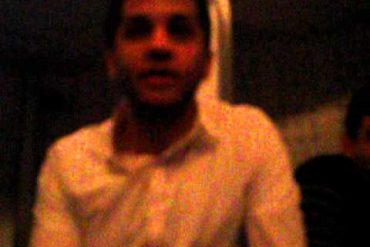2014 has of course been a very difficult year for many minority ethnic and religious groups in the Middle East in general and not least for Christians in Syria and Iraq. With Christmas and the end of the Gregorian year approaching, it was to be expected that the BBC would turn its attentions to the plight of Christians in the Middle East but, as we will see in a moment, the topic of the decimation of those ancient communities in fact took a back seat due to Yolande Knell’s political messaging on a different topic.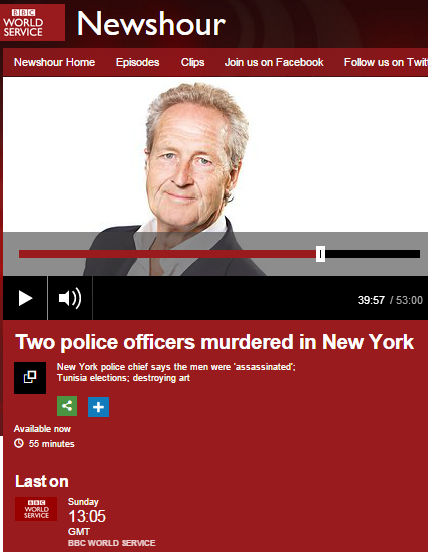
On December 21st the afternoon version of the BBC World Service radio programme ‘Newshour’, presented by Julian Marshall, included an interview (from 00:35:05 here) by Yolande Knell with the Anglican Bishop in Jerusalem, Suheil Dawani. Marshall’s introduction to the item began promisingly:
“In recent months church leaders have expressed concern about the departure of more and more Christians from the Middle East. The civil war in Syria and the advance of Islamic State militants in Iraq have led to appeals for greater support for some of the world’s oldest Christian communities.”
Next, however, listeners were given a hint of what the upcoming item is really about, with Marshall promoting one of the BBC’s newer themes seen in much of its recent content: the historically illiterate claim that the Palestinian-Israeli conflict is morphing from one about land to one with religious overtones.
“In the Holy Land the continuing conflict between Israel and the Palestinians has also shown increasing signs of turning into a religious dispute with a row over holy sites in the Old City of Jerusalem. Our Middle East correspondent Yolande Knell has been to meet the Anglican Bishop of Jerusalem to hear his thoughts on 2014.”
This entire item is four minutes and thirty-five seconds long. A mere thirty-four seconds were allotted to the Bishop’s generalised view of the issue of the plight of Christian communities in Iraq and Syria.
Knell: “Good to meet you, your grace. We’ve come to get your reflections on the past year. Events have been taking place in the region. If we start off with Syria and Iraq – they’re two countries that are covered by your diocese – where we’ve seen Christians fleeing war, Islamic extremism. Of course Christians have been leaving the Middle East now for decades but how has this added to your concerns?”
In fact, Iraq is not part of the Anglican Diocese of Jerusalem (which includes Israel, the PA territories, Syria, Jordan and Lebanon): it falls under the Diocese of Cyprus and the Gulf.
Dawani: “It was a very difficult year for the people of the Middle East in general and for the Christian community in particular. When it has to do with the Anglican Church, I think that we lost most of our presence in Syria because of the conflict that has been in action for the last four years. It was also a big challenge to the Christian presence in Iraq, so it’s really our concern for the future presence of the Christians in the whole Middle East.”
One imagines that there is little in that short statement which BBC audiences did not already know. But Knell passes up on the opportunity to ask the Bishop for more details such as how many Christians remain in Iraq and Syria, what sort of threats they face, where those who have fled have gone and so on and quickly moves on to one of her own pet topics by means of some very dubious linkage between events in Syria and Iraq and those closer to her interviewee’s church in Jerusalem.
Knell: “And here in the Holy Land there have been troubles as well. After the summer conflict between Israel and Palestinian militants in Gaza you went to Gaza yourself. What did you see there?”
Dawani: “In Gaza of course the war that took place it was a devastating one and as an Anglican church we run a hospital in Gaza – Al Ahli Arab Hospital – and during the war we used to receive more than hundred injuries every day and the hospital used to work around the clock. And after the war I visited the Gaza twice and of course I have seen, you know, lots of destruction and I’ve seen that people are very depressed. It wasn’t the last war or the last conflict. The conflict has been continuing year after year. So I believe that something must be done to alleviate the suffering for the people who live there.”
The topic of how many Christians remain in the Gaza Strip and under what sort of conditions they live, given the extremist Islamist regime which controls the territory, clearly does not interest Knell. Instead she turns the focus of her report elsewhere:
Knell: “And here in East Jerusalem, right on your doorstep, tensions have been rising as well. And what we’ve seen here really is in some ways the conflict between Israel and the Palestinians taking on a more religious dimension. I mean how dangerous is that, do you think?”
Dawani: “Let me start by saying that Jerusalem is a very dear city to the three religions – or the three Abrahamic faiths. And it witnessed lots of violence during the last ten months or so, in which religious places has been targeted by some extremists; I can say that whether Muslims or Jews. And Al Aqsa Mosque also witnessed the big fight and as a Christian leaders we really did visit to both Al Aqsa Mosque and even to the synagogue that has been attacked by some people. And our message was very clear: that please don’t attack any holy sites, whether to the Muslims or to the Jews or to the Christians. And I hope and I pray that religion will be part of the solution, not part of the problem.”
Notably, organised violent rioting on Temple Mount by Palestinian youths which has necessitated a police response is placed alongside the terror attack in Har Nof (which, no less remarkably, is now portrayed to BBC audiences as an attack on a holy site rather than the premeditated murder of Jews) to supposedly demonstrate that the two sides are both victims and attackers. That warped narrative is not corrected by Knell and neither does she make any effort to enquire about the situation of Christians living under the rule of the Palestinian Authority.
A slightly different filmed version of the interview with Suheil Dawani – with Knell’s questions edited out – was also published on the BBC News website’s Middle East page under the title “The Anglican Archbishop of Jerusalem reflects on 2014” on December 21st. With similar messaging to that seen in Marshall’s introduction to the audio version of the report, the synopsis to the filmed version also places recent incidents in Israel in the same overall category as persecution of Christians in Iraq and Syria in order to ease the shift to the report’s real subject matter.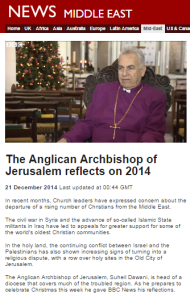
“In recent months, Church leaders have expressed concern about the departure of a rising number of Christians from the Middle East.
The civil war in Syria and the advance of so-called Islamic State militants in Iraq have led to appeals for greater support for some of the world’s oldest Christian communities.
In the holy land, the continuing conflict between Israel and the Palestinians has also shown increasing signs of turning into a religious dispute, with a row over holy sites in the Old City of Jerusalem.
The Anglican Archbishop of Jerusalem, Suheil Dawani, is head of a diocese that covers much of the troubled region. As he prepares to celebrate Christmas this week he gave BBC News his reflections.”
So tough luck for the few remaining Christians trying to survive in Iraq and Syria: their barely described plight is for Yolande Knell merely a hook upon which to hang yet more of the same political messaging, whilst their co-religionists in Jordan and Lebanon and in the de facto Hamas-run Gaza Strip and in the PA-controlled territories do not even get a mention.
Related Articles:
BBC’s Knell politicises St George’s Day with promotion of PA propaganda
BBC’s Knell exploits Christmas report to lie about anti-terrorist fence
Terror excused, Palestinian Christians sold out on BBC World Service
BBC’s Connolly reports on ME Christians: omits the one place they thrive

